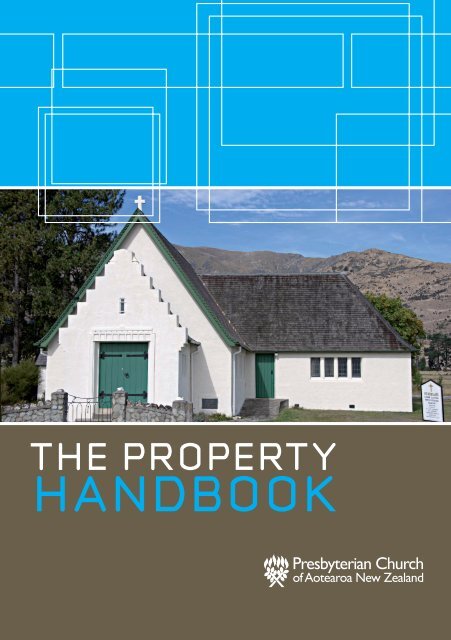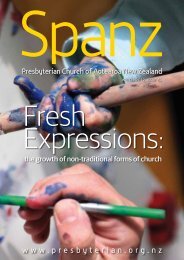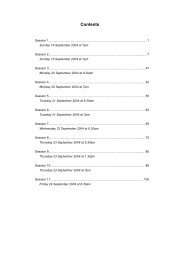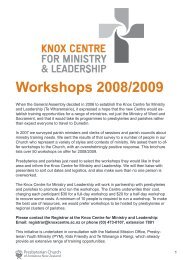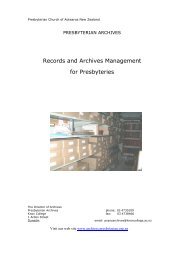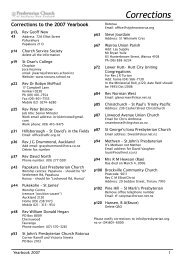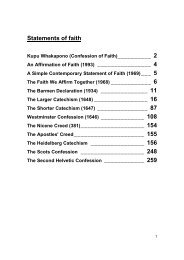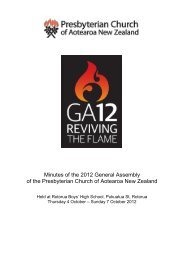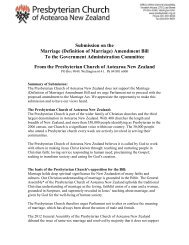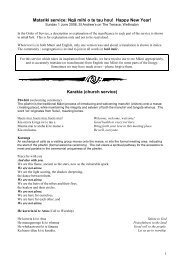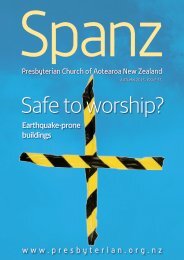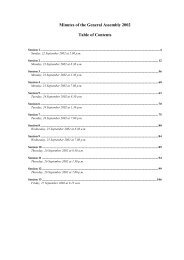Download The Property Handbook - Presbyterian Church of ...
Download The Property Handbook - Presbyterian Church of ...
Download The Property Handbook - Presbyterian Church of ...
Create successful ePaper yourself
Turn your PDF publications into a flip-book with our unique Google optimized e-Paper software.
PAGE ›› 1<br />
THE PROPERTY HANDBOOK<br />
T H E P R O P E RT Y<br />
H A N D B O O K
PAGE ›› 2<br />
THE PROPERTY HANDBOOK<br />
THE PRESBYTERIAN CHURCH<br />
PROPERTY TRUSTEES<br />
THE PROPERTY<br />
HANDBOOK<br />
A GUIDE<br />
for Parishes, Presbyteries & UDCs<br />
when dealing with property<br />
2nd edition 2010
PAGE ›› 3<br />
THE PROPERTY HANDBOOK<br />
TABLE OF CONTENTS<br />
››<br />
Introduction Legal background, status, explanation <strong>of</strong> terms, 5<br />
important first principles<br />
Section 1 Purchase <strong>of</strong> property 11<br />
›› GST, trustees’ fees,rates<br />
›› Minister housing requirements<br />
Section 2 Borrowing by parishes 19<br />
Section 3 Alterations and extensions or new buildings 21<br />
Section 4 Sale <strong>of</strong> property 22<br />
Section 5 Leasing property 27<br />
Section 6 Use <strong>of</strong> property funds 29<br />
Section 7 Gifting property 31<br />
Section 8 Gifting and loaning <strong>of</strong> congregational funds 33<br />
Section 9 Lottery Grants Board applications 35<br />
Section 10 Duties and responsibilities <strong>of</strong> decision makers 37<br />
›› Presbytery / UDCs<br />
›› <strong>Church</strong> <strong>Property</strong> Trustees
PAGE ›› 4<br />
THE PROPERTY HANDBOOK<br />
Application forms for the following purposes are available on request from the<br />
Secretary to the Trustees, phone (04) 381 8290 or 0800 424 872, or email trustees@<br />
presbyterian.org.nz:<br />
›› Purchase property<br />
›› Sell / lease property<br />
›› Alter / extend / erect building<br />
›› Spend / gift / lend capital (property) funds<br />
›› Borrow funds<br />
›› Apply for a Lottery grant
PAGE ›› 5<br />
THE PROPERTY HANDBOOK<br />
INTRODUCTION<br />
Two trusts<br />
Properties belonging to the <strong>Presbyterian</strong> <strong>Church</strong> in New Zealand are vested in two<br />
separate trusts. <strong>The</strong> Waitaki River (North Otago) is the geographical boundary for the<br />
two trusts.<br />
North <strong>of</strong> the Waitaki River, property is vested in <strong>The</strong> <strong>Presbyterian</strong> <strong>Church</strong> <strong>Property</strong> Trustees.<br />
South <strong>of</strong> the Waitaki River, property is vested in the Otago Foundation Trust Board,<br />
although the Synod <strong>of</strong> Otago & Southland handles property approvals.<br />
This handbook is based on the procedures <strong>of</strong> <strong>The</strong> <strong>Presbyterian</strong> <strong>Church</strong> <strong>Property</strong> Trustees.<br />
Refer to the Synod <strong>of</strong> Otago & Southland for its specific requirements.<br />
<strong>The</strong> legal background<br />
Three Acts <strong>of</strong> Parliament establish the framework and principles <strong>of</strong> operation <strong>of</strong> <strong>The</strong><br />
<strong>Presbyterian</strong> <strong>Church</strong> <strong>Property</strong> Trustees. Under the first Act, <strong>The</strong> <strong>Presbyterian</strong> <strong>Church</strong><br />
<strong>Property</strong> Act 1885, <strong>The</strong> <strong>Presbyterian</strong> <strong>Church</strong> <strong>Property</strong> Trustees (<strong>Church</strong> <strong>Property</strong><br />
Trustees) are the registered owners <strong>of</strong>, and are legally responsible for, all <strong>Presbyterian</strong><br />
<strong>Church</strong> property located north <strong>of</strong> the Waitaki River.<br />
<strong>The</strong> other two acts, <strong>The</strong> Trustee Act 1956 and the Charitable Trusts Act 1957, provide<br />
binding legal principles under which the <strong>Church</strong> <strong>Property</strong> Trustees operate.<br />
All property transactions are managed through the <strong>Church</strong> <strong>Property</strong> Trustees.<br />
Sometimes the Trustees obtain special legal advice on rare and difficult transactions.<br />
<strong>The</strong> Book <strong>of</strong> Order is the <strong>Presbyterian</strong> <strong>Church</strong>’s <strong>of</strong>ficial rule book, and covers all<br />
activities <strong>of</strong> the <strong>Church</strong>. It explains the responsibilities <strong>of</strong> church members, and sets out<br />
the procedures for each area <strong>of</strong> governance and management. Every presbytery, parish<br />
and church member is obliged to comply with it, except for members <strong>of</strong> co-operative<br />
ventures in circumstances where the Guide to Procedures in Co-operative Ventures<br />
applies instead.<br />
Chapter 16 <strong>of</strong> the 2006 Book <strong>of</strong> Order deals with property and finance matters.<br />
<strong>The</strong> Book <strong>of</strong> Order can be viewed on the <strong>Presbyterian</strong> <strong>Church</strong> website, www.<br />
presbyterian.org.nz.<br />
<strong>The</strong> Guide to Procedures in Co-operative Ventures can be viewed on the Uniting<br />
Congregations website, www.ucanz.org.nz.
PAGE ›› 6<br />
THE PROPERTY HANDBOOK<br />
Status <strong>of</strong> this handbook<br />
<strong>The</strong> <strong>Property</strong> <strong>Handbook</strong> is provided for guidance only. <strong>The</strong> formal and binding<br />
requirements <strong>of</strong> property transactions are detailed in the legal documents identified. If<br />
there is any doubt, consult your parish’s solicitor.<br />
Explanation <strong>of</strong> Terms<br />
attestation clause<br />
Certificate <strong>of</strong> Title<br />
church council<br />
<strong>Church</strong> <strong>Property</strong> Trustees<br />
execution<br />
fiduciary duty<br />
instrument <strong>of</strong> transfer<br />
Joint Regional Committee<br />
Formal statement describing the manner in which<br />
a legal document is signed. <strong>The</strong> attestation clause<br />
for documents executed by the <strong>Church</strong> <strong>Property</strong><br />
Trustees reads:<br />
“<strong>The</strong> Common Seal <strong>of</strong> <strong>The</strong> <strong>Presbyterian</strong> <strong>Church</strong><br />
<strong>Property</strong> Trustees was hereunto affixed and these<br />
presents signed by two <strong>of</strong> the said Trustees”.<br />
Record which identifies a specific property by legal<br />
description, registered location, size and the owner.<br />
Records <strong>of</strong> properties are now electronically recorded<br />
by LINZ (Land Information New Zealand).<br />
Governing body <strong>of</strong> a congregation. It may be called a<br />
session or parish council or other name.<br />
Shortened form <strong>of</strong> <strong>The</strong> <strong>Presbyterian</strong> <strong>Church</strong> <strong>Property</strong><br />
Trustees. Often abbreviated to CPT.<br />
Act <strong>of</strong> formally signing a legal document. For<br />
<strong>Church</strong> property matters, this is done by affixing<br />
the Common Seal <strong>of</strong> <strong>The</strong> <strong>Presbyterian</strong> <strong>Church</strong><br />
<strong>Property</strong> Trustees.<br />
Responsibility <strong>of</strong> a trustee to act without personal<br />
gain and independently from personal interest.<br />
Formal document upon which the details <strong>of</strong> a sale<br />
and purchase <strong>of</strong> property is entered for recording in<br />
the Land Transfer Office.<br />
Often called JRC. Regional body that oversees cooperative<br />
ventures on behalf <strong>of</strong> partner <strong>Church</strong>es.
PAGE ›› 7<br />
THE PROPERTY HANDBOOK<br />
LIM<br />
loan agreement<br />
manse<br />
mortgage<br />
Land Information Memorandum. A report issued by<br />
a local authority, which contains information about a<br />
property.<br />
Formal document in which all the terms and<br />
conditions pertaining to the money being borrowed<br />
must be disclosed.<br />
Parish residential property which provides<br />
accommodation for the minister and family.<br />
Legal document which sets out the terms and<br />
conditions upon which the security for any borrowing<br />
is effected against property.<br />
partner <strong>Church</strong>es Other denominations in a co-operative venture –<br />
mainly Methodist and/or Anglican.<br />
presbytery<br />
Regional body <strong>of</strong> the <strong>Presbyterian</strong> <strong>Church</strong> which has<br />
oversight <strong>of</strong> all <strong>Presbyterian</strong> parishes in that area.<br />
sale & purchase agreement Legal document in which all the terms and conditions<br />
<strong>of</strong> sale are recorded, signed by the purchaser and<br />
the vendor at the time <strong>of</strong> agreement. Once signed<br />
by both parties, the agreement becomes a binding<br />
contract, subject only to the conditions stated in<br />
the agreement.<br />
title<br />
<strong>The</strong> Trustees<br />
UDC/UCC<br />
valuation<br />
vendor<br />
Yearbook<br />
See Certificate <strong>of</strong> Title. This identifies ownership <strong>of</strong><br />
a property.<br />
For the purposes <strong>of</strong> this handbook, it means <strong>The</strong><br />
<strong>Presbyterian</strong> <strong>Church</strong> <strong>Property</strong> Trustees.<br />
Union District Council or Uniting <strong>Church</strong> Council: a<br />
council appointed by the <strong>Presbyterian</strong> and Methodist<br />
<strong>Church</strong>es to jointly carry out the equivalent duties <strong>of</strong><br />
a presbytery in an agreed region.<br />
Report from a registered valuer, stating the condition<br />
and current market value <strong>of</strong> the property under<br />
consideration.<br />
Owner <strong>of</strong> the property which is being sold.<br />
Directory containing contact details for every parish,<br />
minister and nationally appointed organisation within<br />
the <strong>Presbyterian</strong> <strong>Church</strong>.
PAGE ›› 8<br />
THE PROPERTY HANDBOOK<br />
Important<br />
First<br />
Principles<br />
Principle 1<br />
Everyone making decisions about property or finance within the <strong>Church</strong> is a “trustee.”<br />
Elders, managers, deacons, presbytery/UDC members and the <strong>Presbyterian</strong> <strong>Church</strong><br />
<strong>Property</strong> Trustees (the Trustees) all have responsibilities under <strong>The</strong> Trustees Act 1956<br />
(Refer page 27).<br />
• We all are required to act with care and prudence, in a trustee capacity.<br />
Principle 2<br />
We are a <strong>Church</strong> – not a collection <strong>of</strong> independent congregations<br />
• Parishes are under the oversight <strong>of</strong> presbyteries/UDCs, and the Trustees.<br />
• <strong>The</strong> necessary approvals must be obtained before action is taken. For co-operative<br />
ventures, the partner <strong>Church</strong>(es) should also be consulted.<br />
Principle 3<br />
Our decisions must keep faith with the long-term interests <strong>of</strong> the whole <strong>Church</strong>.
PAGE ›› 9<br />
THE PROPERTY HANDBOOK<br />
<strong>The</strong> congregations <strong>of</strong> the future will inherit our choices.<br />
<strong>The</strong> 2008 General Assembly endorsed the principle that all property transactions<br />
should serve the purposes <strong>of</strong> God’s mission. <strong>The</strong> Assembly adopted guidelines which<br />
the <strong>Church</strong> <strong>Property</strong> Trustees were asked to take into account when considering<br />
applications in relation to parish property proposals.<br />
All applications to the <strong>Church</strong> <strong>Property</strong> Trustees must now be accompanied by responses<br />
to supplementary questions that are based on the Assembly guidelines.<br />
<strong>The</strong>se requirements apply to all property transactions, including the purchase, sale or<br />
leasing <strong>of</strong> property, and to major building projects.<br />
For any proposal, the congregation is asked to provide evidence <strong>of</strong> its financial<br />
sustainability, to explain how the proposal fits into the congregation’s mission plan,<br />
and to demonstrate how this project will contribute to God’s mission and the growth<br />
<strong>of</strong> the church.<br />
<strong>The</strong> presbytery has to assess how realistic the congregation has been in its responses<br />
to the supplementary questions, and explain how the proposal fits into the regional<br />
mission strategy.
PAGE ›› 10<br />
THE PROPERTY HANDBOOK<br />
››
PAGE ›› 11<br />
THE PROPERTY HANDBOOK<br />
SECTION 01<br />
Purchase <strong>of</strong> property<br />
General guidelines<br />
Ask yourselves how this purchase will fit the mission <strong>of</strong> the congregation.<br />
Once there is a written clear answer to this question, the rest should flow quite easily.<br />
Allow sufficient time, and consult as early as possible with the next people in the chain.<br />
• Allow at least two months to prepare your application, and to obtain the approval <strong>of</strong><br />
the congregation, presbytery and the Trustees.<br />
• Talk early on to your presbytery/UDC and Secretary to the Trustees about your<br />
general plans and time frames. As each step comes closer, it will help to make<br />
early contact (even informally and in confidence) to alert them that decisions are<br />
underway. Challenging or unusual proposals may take extra time.<br />
• Find out from your presbytery clerk when Presbytery’s <strong>Property</strong> Committee<br />
meets, as generally this committee will consider the application and then make<br />
a recommendation to presbytery. Presbyteries normally meet monthly. Some<br />
property and finance committees are authorised to act as a commission <strong>of</strong><br />
presbytery for property transaction applications. You should have your application<br />
to this committee, through the presbytery clerk, at least a week before it meets.<br />
• <strong>The</strong> Trustees generally meet monthly (apart from the Christmas break), and<br />
applications need to be received at least a week before the meeting, in order for the<br />
documentation to be summarised and circulated with the agenda papers. Contact<br />
the Secretary to the Trustees for details.<br />
• It may save time if you can make direct contact with the <strong>Church</strong> Architecture<br />
Reference Group regional convenor (see the Yearbook) before your plans are well<br />
advanced, and before your application goes to Presbytery.<br />
Remember this will be an asset held in trust for the congregation <strong>of</strong> the future as well<br />
as the present.<br />
All parties need to be involved in the decision-making. <strong>The</strong> asset does not belong to<br />
just one little group <strong>of</strong> the congregation. It is an asset, to be held in trust, for the benefit<br />
<strong>of</strong> many others.
PAGE ›› 12<br />
THE PROPERTY HANDBOOK<br />
Do the thinking before you look, and again before you purchase.<br />
Talk through all the issues (purpose, function, location, financing, time frames as well<br />
as structure, price, legal title etc) before you start looking to purchase. It would be<br />
prudent to review these guidelines again as you come to complete a purchase on a<br />
particular property.<br />
Set the necessary authorities in place as you proceed.<br />
Try to obtain approval to act (maybe within constraints) ahead <strong>of</strong> time. You will need<br />
formal approval from the congregation to proceed. It is usual for a congregation to<br />
delegate the purchasing process to a small subcommittee. If you are planning to borrow<br />
money for the purchase, you will also need to follow the borrowing procedures set out<br />
in Section 2 <strong>of</strong> this handbook.<br />
See the checklist at the end <strong>of</strong> this section to help you through the process.<br />
To purchase a property you need the approval <strong>of</strong>:<br />
• <strong>Church</strong> council (session / parish council)<br />
• Congregation<br />
• Presbytery/UDC<br />
• <strong>Church</strong> <strong>Property</strong> Trustees<br />
Ask the Trustees’ Office for the relevant application forms and supplementary<br />
questions. Email trustees@presbyterian.org.nz for electronic copies.<br />
Note: All <strong>Church</strong> <strong>Property</strong> Trustees’ property approvals are valid for six months.<br />
Approval may be extended to 12 months in exceptional circumstances.<br />
Suggested selection criteria<br />
• Is the property within the price band approved by the congregation?<br />
• Is the location suitable for the building’s intended purpose?<br />
• Is it located near the parish <strong>of</strong>fice and main worship centre?<br />
• If this is to be a manse, is it near to schools?<br />
• Is it convenient to public transport?<br />
• Is the property in good condition?<br />
• Are there any deferred maintenance or ongoing maintenance issues?<br />
• Are there any conditions associated with the title?<br />
• Does it have good resale potential (particularly for a manse)?<br />
• Are there any health and safety issues?<br />
• Does the local authority LIM report raise any concerns?
PAGE ›› 13<br />
THE PROPERTY HANDBOOK<br />
If you are looking to purchase a manse, include the requirements on page 12.<br />
Completing Agreement for Sale & Purchase<br />
• Don’t sign anything until you have taken advice from your parish solicitor.<br />
• Name “<strong>The</strong> <strong>Presbyterian</strong> <strong>Church</strong> <strong>Property</strong> Trustees” as the “Purchaser”.<br />
• Include this clause: “conditional on approval <strong>of</strong> <strong>The</strong> <strong>Presbyterian</strong> <strong>Church</strong><br />
<strong>Property</strong> Trustees”.<br />
• Where borrowing is required, insert this clause: “conditional upon approval to<br />
borrowing on terms and conditions acceptable in all respects to the parish”.<br />
• Consult the Secretary to the Trustees about authority to sign the Agreement for<br />
Sale & Purchase.<br />
Follow-up after <strong>Church</strong> <strong>Property</strong> Trustees’ approval<br />
Consult your parish’s solicitor when you start looking for a property. <strong>The</strong> solicitor will<br />
ask the parish to sign a letter <strong>of</strong> engagement. (<strong>The</strong> <strong>Church</strong> <strong>Property</strong> Trustees do not<br />
engage the solicitor.)<br />
• Do not sign anything (especially the sale and purchase agreement) without your<br />
solicitor’s approval. Signing should be done by two authorised parish representatives.<br />
• Your solicitor will ask for the purchase funds in advance <strong>of</strong> the agreed settlement<br />
date. If the funds are held in your <strong>Presbyterian</strong> Investment Fund property account,<br />
ask the Trustees’ Office to transfer the required money to your parish bank account<br />
well before it is needed. If you are borrowing a portion <strong>of</strong> the purchase price,<br />
ensure the lender knows when, and where, to transfer the funds. (If borrowing is<br />
required to fund the purchase, prior approval from the <strong>Church</strong> <strong>Property</strong> Trustees is<br />
essential. Refer to “Section 2: Borrowing by parishes”.)<br />
• All property valuations must be no more than 90 days old at the time <strong>of</strong> signing a<br />
sale and purchase agreement.<br />
• Your solicitor will arrange for the registration <strong>of</strong> the transfer <strong>of</strong> ownership, which<br />
involves sending an Authorisation and Instruction (A & I) legal document to the<br />
<strong>Church</strong> <strong>Property</strong> Trustees for signing under Common Seal. Advise your solicitor that<br />
a copy <strong>of</strong> the signed sale and purchase agreement, and a copy <strong>of</strong> the Certificate <strong>of</strong><br />
Title, must accompany the A & I form.
PAGE ›› 14<br />
THE PROPERTY HANDBOOK<br />
Are there ‘fast track’ possibilities?<br />
Yes. Sometimes a property becomes available in a rush, particularly if there is a<br />
tender deadline. And church court time frames can take ages and ages . . . .<br />
<strong>The</strong> key is preparation, early warning signals, and the earliest possible attention to<br />
written documentation – especially mission statements.<br />
When there is genuine urgency, phone calls, faxes and emails will help<br />
meet deadlines.<br />
It is difficult to ‘fast track’ proposals which are challenging or unusual.<br />
For the <strong>Church</strong> <strong>Property</strong> Trustees contact:<br />
<strong>The</strong> Secretary: ph 04 381 8290 or 0800 424 872<br />
fax 04 801 6001<br />
email trustees@presbyterian.org.nz
PAGE ›› 15<br />
THE PROPERTY HANDBOOK<br />
CHECKLIST FOR ROUTINE<br />
PROPERTY PURCHASES<br />
Note: Keep copies <strong>of</strong> everything for your parish records<br />
p Approval ‘in principle’ by church council.<br />
p Agreement ‘in principle’ by congregation.<br />
p Working party authorised to proceed.<br />
p Congregation mission plan prepared, together with statements relating property<br />
purchase to the mission.<br />
p Application prepared for presbytery/UDC and <strong>Church</strong> <strong>Property</strong> Trustees.<br />
p Criteria checklist prepared, against which to measure potential properties. (This<br />
section <strong>of</strong> the handbook has suggestions. Add to this any other factors special to<br />
your situation.)<br />
p Will you need to borrow money? If so, congregation, presbytery/UDC and the<br />
Trustees all need to give formal approval.<br />
p Engage a registered valuer to provide a market value report on your preferred<br />
property.<br />
p If your preferred property is for sale by tender, be prepared to act quickly to meet<br />
tender deadline.<br />
p Negotiate and settle purchase price.<br />
p Unless you already have confirmed approval from the Trustees, enter into a<br />
conditional agreement for sale and purchase, in consultation with parish solicitor<br />
(see specifications in this section).<br />
p Alert the <strong>Church</strong> <strong>Property</strong> Trustees.<br />
p Unless a small group has delegated authority (preferable), you may need to place a<br />
proposal before congregation, to gain final approval. Ensure the details are recorded<br />
at each stage.<br />
p If not already done, complete an ‘application to purchase’ form (request a printed<br />
or emailed copy from the Trustees’ <strong>of</strong>fice), and forward it together with all other<br />
required documents to the presbytery/UDC. (Presbytery will complete its section<br />
and forward everything to the <strong>Church</strong> <strong>Property</strong> Trustees.)<br />
p Before settlement day, remember to ask the PCANZ insurance administrator to add<br />
the new property to your parish’s property schedule.
PAGE ›› 16<br />
THE PROPERTY HANDBOOK<br />
GST<br />
• No GST implication for sale and purchase <strong>of</strong> residential property e.g. manses.<br />
• GST is involved with all other <strong>Church</strong> property.<br />
For the purposes <strong>of</strong> the Goods and Services Tax Act 1985, the purchaser/seller <strong>of</strong> the<br />
property in question is the Trustees. Ask your solicitor to issue the settlement statement<br />
(and GST invoice) in the name <strong>of</strong> “<strong>The</strong> <strong>Presbyterian</strong> <strong>Church</strong> <strong>Property</strong> Trustees” (not in<br />
the name <strong>of</strong> the parish.)<br />
For a property sale, the Trustees will deal with the actual sale price (but not associated<br />
costs) as an input in their GST return, and the amount involved when paid will be<br />
deducted from the sale proceeds.<br />
<strong>The</strong> sale <strong>of</strong> gifted property is exempt GST pursuant to Section 14(1) (b) <strong>of</strong> the GST<br />
Act 1985. Pro<strong>of</strong> <strong>of</strong> gifting must be provided. Parishes should take care to advise the<br />
Secretary to the Trustees <strong>of</strong> the original price <strong>of</strong> all property so that the correct GST<br />
liability can be calculated.<br />
<strong>The</strong> Trustees’ GST number is 55 228 752.<br />
Trustees’ Costs<br />
Administration costs and legal fees are incurred by the Trustees in handling property<br />
transactions on behalf <strong>of</strong> parishes. Parishes will be invoiced for these as follows:<br />
Sale or purchase <strong>of</strong> property - value over $250,000 $250<br />
Sale or purchase <strong>of</strong> property - value $50,000 - $250,000 $150<br />
Sale or purchase <strong>of</strong> property - value under $50,000 $100<br />
All other routine transactions $100<br />
Where transactions involve extra legal costs, these costs will also be charged to the parish.<br />
In special circumstances, fees may be reduced or waived.<br />
Rates<br />
If you purchase a residential property (such as a manse), you must pay rates on it.<br />
If you purchase a church, or another building which will be used mainly for religious<br />
purposes (such as a hall), the property should be largely exempt from local government<br />
body rates. Don’t assume this will happen automatically. Check with your local body<br />
and, if necessary, apply for an exemption. This should be done as soon as the property<br />
changes hands.<br />
If you need advice on a particular property, contact the Secretary to <strong>The</strong> Trustees.
PAGE ›› 17<br />
THE PROPERTY HANDBOOK<br />
Minister’s housing requirements<br />
<strong>The</strong> <strong>Church</strong>’s regulations on housing for ministers are set out in the Conditions <strong>of</strong> Service<br />
Manual, which is a supplementary provision to the Book <strong>of</strong> Order. Further details are in<br />
the Accommodation for Ministers guidelines. (See the <strong>Presbyterian</strong> website.)<br />
You may provide accommodation for your minister by:<br />
• owning a house <strong>of</strong> an approved standard<br />
• providing an accommodation allowance to the minister *<br />
• leasing a house from an independent owner<br />
• leasing a house from the minister **<br />
<strong>The</strong>re will be taxation implications for the minister in respect <strong>of</strong> the amount paid as rent.<br />
Consult the Secretary to <strong>The</strong> Trustees if you need advice.<br />
* If the minister is to be paid either an accommodation allowance or rent, it should be<br />
the lower <strong>of</strong> the market rental for a suitable property within an appropriate radius <strong>of</strong><br />
the main worship centre or main site <strong>of</strong> the ministry, or the cost <strong>of</strong> the mortgage on a<br />
house owned by the minister. Presbyteries <strong>of</strong>ten set guidelines.<br />
** Leasing a house from the minister is the least preferred option, and there is a risk<br />
that IRD will challenge it. In any event, the rental should be established having regard to<br />
market rental prices in the area.<br />
<strong>The</strong> manse should be within a reasonable radius <strong>of</strong><br />
the main worship centre <strong>of</strong> the congregation.<br />
Exceptions to this must be approved by congregation and presbytery/UDC.<br />
What kind <strong>of</strong> accommodation?<br />
Congregations should provide attractive, appropriate accommodation for their ministers.<br />
Minimum requirements for a manse<br />
• Adequate living space which is separate from the space used for church activities<br />
• Facilities for <strong>of</strong>fering hospitality<br />
• A study/<strong>of</strong>fice with adequate shelving unless this is provided elsewhere<br />
• A washing machine and a refrigerator with adequate freezer space<br />
• Floor coverings in all rooms<br />
• Wardrobes in all bedrooms
PAGE ›› 18<br />
THE PROPERTY HANDBOOK<br />
• Drapes or blinds<br />
• Adequate heating for all living areas and the study<br />
Your manse needs to be safe<br />
Congregations with property (including a manse) have responsibilities and liabilities<br />
for these. All practical steps should be taken to eliminate, isolate and minimise any<br />
potential hazards.<br />
Refer to the Risk Management <strong>Handbook</strong> provided free by the <strong>Church</strong>’s insurers, or call<br />
the <strong>Church</strong> <strong>Property</strong> Trustees.<br />
For further information, see www.presbyterianworkingsafe.org.nz.<br />
Safety checklist<br />
• Fencing, paths, steps, staircases and railings, decking and verandas are sound<br />
and free <strong>of</strong> obstructions.<br />
• Exterior lighting is installed as appropriate.<br />
• Interior wiring, plugs and appliances are safety tested.<br />
• Hot water temperature is appropriate.<br />
• Smoke detectors are installed and working, and emergency exits available.<br />
• Ensure there is an alternative exit from upstairs in the event <strong>of</strong> a fire.<br />
• Secure storage for dangerous substances.<br />
When thinking <strong>of</strong> safety, anticipate that children will visit the manse, even if<br />
the current manse family itself does not have children.
PAGE ›› 19<br />
THE PROPERTY HANDBOOK<br />
SECTION 02<br />
Borrowing by parishes<br />
Trustees’ discretion<br />
All borrowing is at the absolute discretion <strong>of</strong> the <strong>Church</strong> <strong>Property</strong> Trustees. This includes<br />
a capacity to vary the routine conditions in exceptional circumstances, including the<br />
refusal <strong>of</strong> authorisation <strong>of</strong> applications.<br />
Limits on borrowing<br />
• Maximum <strong>of</strong> 50% <strong>of</strong> the cost <strong>of</strong> a project may generally be borrowed.<br />
• Loans on low or nil interest are included in this condition.<br />
• <strong>The</strong> borrowing term is limited to a maximum <strong>of</strong> 15 years.<br />
Why there are limits<br />
• To ensure wide parish buy-in to proposals.<br />
• To ensure current parish members do not overburden future members.<br />
• To prevent over-commitment.<br />
Required approvals<br />
• Whole-hearted congregational support <strong>of</strong> the proposed borrowing, including formal<br />
voting <strong>of</strong> 80% support at the relevant congregational meeting.<br />
• Formal presbytery/UDC endorsement <strong>of</strong> the proposal to borrow.<br />
• Presbytery/UDC assessment <strong>of</strong> the viability <strong>of</strong> the proposal, including capacity to<br />
service the borrowing.<br />
Urgent proposals<br />
In exceptional circumstances, the Trustees will consider urgent proposals, under<br />
stringent conditions. Contact the Secretary to the Trustees for details.<br />
Legal issues<br />
Your solicitor will prepare a Memorandum <strong>of</strong> Mortgage. It will include a clause limiting<br />
liability to the property over which the loan is secured. It should read something like this:<br />
“<strong>The</strong> liability <strong>of</strong> the Trustees under the terms <strong>of</strong> this Memorandum <strong>of</strong> Mortgage shall be<br />
limited to the property as set out in the schedule hereto, and shall not constitute a debt<br />
payable by the Trustees or their successors in <strong>of</strong>fice out <strong>of</strong> any other fund or property.”
PAGE ›› 20<br />
THE PROPERTY HANDBOOK<br />
<strong>Presbyterian</strong> Savings and Development Society<br />
This organisation is a common source <strong>of</strong> mortgage money for churches. If your<br />
application to borrow is approved, and you are using PSDS, a copy <strong>of</strong> the letter <strong>of</strong><br />
approval is sent to PSDS who will arrange the necessary mortgage documents for the<br />
Trustees to execute.<br />
Suspensory loans for pre-schools<br />
Government may advance loans <strong>of</strong> up to 90% <strong>of</strong> the cost <strong>of</strong> a preschool project, but<br />
will require full repayment within five years should the project fail. <strong>The</strong> Trustees will<br />
consider such applications on the following basis:<br />
• Full business case, including assessment <strong>of</strong> neighbourhood preschools.<br />
• Contingency plan for repayment that does not impact on core parish mission.<br />
• Presbytery/UDC approval <strong>of</strong> application, and <strong>of</strong> liabilities incurred.
PAGE ›› 21<br />
THE PROPERTY HANDBOOK<br />
SECTION 03<br />
Alterations and extensions<br />
or new buildings<br />
<strong>The</strong> guidelines for purchasing a property also apply to substantial structural alterations<br />
to a church property, or to erecting a new building on church property.<br />
Refer to Book <strong>of</strong> Order Chapter 16, and its Supplementary Provisions, for the regulations<br />
governing this process. If the building project is a major one, presbytery must obtain<br />
a report from the <strong>Church</strong> Architecture Reference Group before it gives approval. It<br />
may save time if the congregation makes contact with the nearest Reference Group<br />
representative early in the process.<br />
<strong>The</strong> Book <strong>of</strong> Order and its supplementary provisions may be viewed at www.<br />
presbyterian.org.nz.
PAGE ›› 22<br />
THE PROPERTY HANDBOOK<br />
SECTION 04<br />
Sale <strong>of</strong> property<br />
How will the sale <strong>of</strong> this property fit the mission <strong>of</strong> the congregation?<br />
Presbytery/UDC and the Trustees will want to know this, and it will clarify your thinking<br />
if you answer it at the beginning.<br />
Are there any special trusts e.g. bequests attached to the property which may<br />
hinder or prevent its sale?<br />
Remember that the property you have is an asset received ‘in trust’ from the past<br />
congregation.<br />
This means there may be limits on what you can do with it, and with the proceeds<br />
from the sale. If the property was gifted to the congregation, any conditions associated<br />
with the original gift must be fulfilled. Any difficulties should be resolved before the<br />
sale goes ahead.<br />
Sometimes, the wider local community in which a surplus church is sited (particularly<br />
in rural areas) may have strong views about what should happen to it. Appropriate<br />
consultation with the community can help avoid negative publicity. Remember that<br />
church property is a trust from all the past members <strong>of</strong> your congregation, going right<br />
back to its establishment. <strong>The</strong> assets have been given in the expectation they will<br />
continue to be used for the mission <strong>of</strong> the <strong>Presbyterian</strong> <strong>Church</strong>.<br />
<strong>Property</strong> can be sold if:<br />
• it is no longer needed - but there may be limitations on what can be done with the<br />
proceeds. <strong>The</strong>se are set out in Section 6 <strong>of</strong> this handbook.<br />
• you wish to replace it with a property which will better fulfil the mission <strong>of</strong> the<br />
church – in which case you need to consider the objectives <strong>of</strong> both the sale and<br />
the purchase, and comply with the regulations in both this section and the previous<br />
section on purchasing property.<br />
<strong>The</strong> proposal must have the approval <strong>of</strong> the church council, the congregation,<br />
presbytery/UDC and the Trustees.<br />
It pays to consult with, and get approval from, these bodies as early as possible in the<br />
process. Remember: at each decision-making stage there needs to be a formal written<br />
record. (See the application for approval to sell form.)<br />
A check list to guide you through these steps is given at the end <strong>of</strong> this section.
PAGE ›› 23<br />
THE PROPERTY HANDBOOK<br />
Before you sign a contract, you must:<br />
• Either gain conditional approval from the Trustees, based on the valuation before<br />
you start (giving a minimum price you can accept)<br />
• Or make your sale agreement subject to the approval <strong>of</strong> <strong>The</strong> <strong>Presbyterian</strong><br />
<strong>Church</strong> <strong>Property</strong> Trustees.<br />
<strong>The</strong> Trustees prefer the conditional sale method as it allows for rapid action when a<br />
purchaser is found.<br />
You must have a valuation<br />
You will need to submit a recent market valuation <strong>of</strong> the property, undertaken by a<br />
registered valuer, as the Trustees have to be sure a reasonable price is being received.<br />
(Rating valuations or estimates by real estate firms are not sufficient.) It pays to obtain<br />
a valuation early in the process, so that you know the likely sale price band. Valuations<br />
must be no more than 90 days old at the time <strong>of</strong> signing a sale and purchase agreement,<br />
so you may need to ask your valuer to provide an update if there is a lengthy period<br />
between gaining approval to sell and finding a buyer.<br />
A word about real estate agents<br />
Parishes frequently use real estate agents to market the property.<br />
• Most agents want a sole agency. It is prudent to invite several proposals before<br />
making a decision.<br />
• If you do decide to use a sole agency, then your contract (Sole Agency Agreement)<br />
with them should be for a short duration e.g. 60 days. This time limit must be<br />
written into the contract.<br />
• If you sell a property while there is a sole agency agreement in operation, you will<br />
have to pay the agent’s fee even if they had nothing to do with the sale.<br />
• It is good practice to have your parish solicitor approve the proposed agency<br />
agreement before you sign it.<br />
When you find a purchaser<br />
You may sign an agreement to sell BUT it must be conditional on the approval <strong>of</strong> the<br />
Trustees, unless you already have that approval. <strong>The</strong> wording required is “conditional<br />
on the approval <strong>of</strong> <strong>The</strong> <strong>Presbyterian</strong> <strong>Church</strong> <strong>Property</strong> Trustees.”<br />
If you already have conditional approval from the Trustees, then your agreement<br />
must comply with that approval in all respects, otherwise you must sign a conditional<br />
contract and go back to the Trustees for a new approval.<br />
Does the agreed price include GST, or is it plus GST if applicable? Make sure you cross
PAGE ›› 24<br />
THE PROPERTY HANDBOOK<br />
out on the agreement the option which does not apply. (If you overlook this small print,<br />
the agreement will automatically include GST.)<br />
Do not sign anything until your parish solicitor has approved it. Once you have signed,<br />
the contract is binding.<br />
After the sale<br />
• Your parish solicitor will handle the settlement.<br />
• Your solicitor will prepare a Memorandum <strong>of</strong> Transfer and send it to the Secretary<br />
<strong>of</strong> the Trustees for execution.<br />
• Your solicitor will repay any outstanding mortgages, and other costs, then forward<br />
the net sale proceeds to the Trustees. <strong>The</strong>se funds will be held in a <strong>Presbyterian</strong><br />
Investment Fund property account in the congregation’s name.<br />
• If GST is payable on the sale, the Trustees will pay this, from the funds deposited in<br />
your PIF account.<br />
• <strong>The</strong> Trustees will invoice the parish for administration costs. (See page 16.)<br />
• <strong>The</strong>re are limits on what you can use this money for. <strong>The</strong>se are set out in Section 6.
PAGE ›› 25<br />
THE PROPERTY HANDBOOK<br />
Checklist for routine <strong>Property</strong> Sales<br />
p Place proposal before church council. Record the details at all stages.<br />
p Approval by church council.<br />
p Agreement by congregation.<br />
p Sub-committee set up to oversee the sale and to consult parish solicitor. If the<br />
land was gifted to the church, check that there were no conditions in the original<br />
bequest about selling the property.<br />
p Update the congregation’s mission plan and statements <strong>of</strong> how the sale relates to this.<br />
p Ask the Trustees’ Office to send the relevant application forms, and supplementary<br />
questions.<br />
p Have the property valued (by a registered valuer) before placing the property on the<br />
market. Include a copy with your application to sell. Note: Minimum acceptable sale<br />
price is commercially sensitive, and should be kept confidential as far as is possible.<br />
Valuations must be no more than 90 days old at the time a sale and purchase<br />
agreement is signed, so you may need to have it updated if the property does not<br />
sell within a short time.<br />
p Approval <strong>of</strong> presbytery and Trustees (in principle, if necessary, although this will<br />
require subsequent final approval.)<br />
p Appoint real estate agent(s) to market the property (if required). A sole agency must<br />
have a definite end date.<br />
p Negotiate and agree sale price and conditions. Consult your solicitor before signing<br />
anything. <strong>The</strong>re should be two parish signatories.<br />
p Enter into a conditional agreement, in consultation with your parish solicitor, unless<br />
the sale complies with the approval already obtained from the Trustees.<br />
p Check the small print relating to GST, to make it clear whether the price includes<br />
GST, or ‘plus GST if applicable’.<br />
p Parish solicitor handles the settlement <strong>of</strong> the sale. (Warn your solicitor to send the land<br />
transfer documents to the Trustees’ Office at least a week before settlement date.)
PAGE ›› 26<br />
THE PROPERTY HANDBOOK<br />
››
PAGE ›› 27<br />
THE PROPERTY HANDBOOK<br />
Leasing property<br />
Leases are involved when a congregation:<br />
• needs to rent additional property for its use<br />
• decides to lease out a property, or part <strong>of</strong> it, for income.<br />
First step<br />
How will this lease fit the mission <strong>of</strong> the congregation?<br />
This is especially important for a lease <strong>of</strong> over one year.<br />
Before you enter into either kind <strong>of</strong> lease you must have approval from<br />
• <strong>Church</strong> council.<br />
• Congregation (if the lease is for more than one year).<br />
• Presbytery/UDC.<br />
• <strong>Church</strong> <strong>Property</strong> Trustees.<br />
Note: Renewals <strong>of</strong> leases require the same approvals as the original lease. Allow time<br />
for these to be obtained.<br />
Application forms are available from the Trustees’ Office. Email trustees@presbyterian.<br />
org.nz or call the Secretary on 04 381 8290.<br />
Legal points<br />
Any lease document must be in writing and prepared (or approved) by your parish solicitor.<br />
<strong>The</strong> lease must include:<br />
• <strong>The</strong> Trustees as lessee (if you are renting additional property) or lessor (if you are<br />
receiving money for renting out your existing property)<br />
• <strong>The</strong> legal description <strong>of</strong> the property<br />
• <strong>The</strong> time-length <strong>of</strong> the lease<br />
• <strong>The</strong> amount <strong>of</strong> the rental<br />
SECTION 05<br />
• Any renewal rights and obligations<br />
• A clause limiting liability <strong>of</strong> the <strong>Church</strong> <strong>Property</strong> Trustees to the property being<br />
leased. (See next page.)
PAGE ›› 28<br />
THE PROPERTY HANDBOOK<br />
• An inventory <strong>of</strong> chattels<br />
• It may include a bond payment.<br />
If the lease is a residential tenancy, you must also ensure you understand your obligations,<br />
and abide by the Residential Tenancies Act. Copies are widely available together with<br />
standard tenancy agreements e.g. at PostShops, or online at www.dbh.govt.nz/tenancy.<br />
“Limitation <strong>of</strong> liability” clause<br />
This clause is inserted because the Trustees legally own a great deal <strong>of</strong> property on behalf<br />
<strong>of</strong> the <strong>Presbyterian</strong> <strong>Church</strong> – most <strong>of</strong> it property being held for other congregations. It<br />
is important that liability is restricted to the actual property involved.<br />
<strong>The</strong> clause should read something like this (consult your solicitor):<br />
“<strong>The</strong> liability <strong>of</strong> the Trustees under the terms <strong>of</strong> this Deed <strong>of</strong> Lease shall be limited<br />
to the property as set out in the schedule (attached) and shall not constitute a debt<br />
payable by the Lessee (or Lessor as appropriate) or their successors in <strong>of</strong>fice out <strong>of</strong> any<br />
other fund or property.”<br />
It is the congregation’s responsibility to ensure any conditions attached to leases<br />
are fulfilled. <strong>The</strong> church council must give the required notice to renew a lease<br />
that has a “right <strong>of</strong> renewal” clause.<br />
Insurance <strong>of</strong> leased property<br />
• Leasing part <strong>of</strong> your property may affect your insurance cover.<br />
• It may be prudent to also require the lessee to carry their own insurance e.g. public<br />
liability<br />
• Ask the <strong>Church</strong>’s insurance brokers (AON) for advice.<br />
Keeping records<br />
Make sure that you keep a careful record <strong>of</strong> all leases and other property transactions.<br />
This record keeping is important:<br />
• for successors in <strong>of</strong>fice<br />
• for charting exactly what has to be done in the future<br />
• the date/time for follow up.
PAGE ›› 29<br />
THE PROPERTY HANDBOOK<br />
Use <strong>of</strong> property funds<br />
Why are there limits on the use <strong>of</strong> money raised by selling property?<br />
Your parish property is in the nature <strong>of</strong> a trust which you have received from the past<br />
members <strong>of</strong> your congregation. <strong>The</strong> General Assembly has decided that money raised<br />
by selling property is, in general, ‘ring-fenced’, because it was from a property trust.<br />
What can’t the capital be used for?<br />
<strong>The</strong> proceeds <strong>of</strong> sale <strong>of</strong> property cannot be used for the running costs <strong>of</strong> the current<br />
congregation:<br />
• minister’s stipend or staff salaries<br />
• administration costs<br />
• heat, light, power, insurances etc.<br />
• worship materials e.g. hymn books, projectors<br />
• vehicles<br />
• <strong>of</strong>fice equipment, appliances, sound systems etc<br />
• routine maintenance.<br />
What can the capital be used for?<br />
<strong>The</strong> proceeds <strong>of</strong> sale <strong>of</strong> property can be used for adding to your property through:<br />
• buying or building property<br />
• buying land<br />
• repaying mortgages<br />
• growth projects.<br />
SECTION 06<br />
What else might it be used for?<br />
You might be allowed to use property money for major maintenance items, or for<br />
adding to the value <strong>of</strong> your existing property, providing certain conditions are met. Such<br />
approval is at the Trustees’ discretion. <strong>The</strong> main criteria are<br />
• How necessary is the expenditure?<br />
• Why is the parish unable do this from current income?<br />
• How will this expenditure benefit the future mission <strong>of</strong> the church?
PAGE ›› 30<br />
THE PROPERTY HANDBOOK<br />
<strong>The</strong>se types <strong>of</strong> expenditure might be approved<br />
• extensions and major maintenance <strong>of</strong> buildings<br />
• painting the existing buildings<br />
• major refurbishments <strong>of</strong> the interior, including carpeting<br />
• purchase or repair <strong>of</strong> the principal musical instrument used in services<br />
• costs associated with fulfilling legal requirements e.g. building warrant <strong>of</strong> fitness<br />
• security and fire protection installations<br />
How do we apply to use the proceeds <strong>of</strong> the sale <strong>of</strong> property?<br />
Any application to use capital funds needs to be approved by:<br />
• Board <strong>of</strong> managers/ deacons court/ parish council<br />
• Congregation<br />
• Presbytery/UDC<br />
• <strong>Church</strong> <strong>Property</strong> Trustees<br />
<strong>The</strong> Trustees’ approval must be received before you commit to spending the money.<br />
Application forms, together with supplementary questions, are available from the Secretary<br />
to the Trustees. Depending on what you propose, presbytery/UDC and the Trustees may<br />
ask for your parish accounts, valuations <strong>of</strong> the property, and plans and costings.<br />
If you are planning to use property money, check early<br />
with the Secretary to the Trustees as to whether your<br />
proposal is likely to be within the <strong>Church</strong> <strong>Property</strong> Trustees’ discretion.<br />
What happens to property money we aren’t spending?<br />
<strong>Property</strong> capital funds which you are not using must be held in the <strong>Presbyterian</strong><br />
Investment Fund. Interest earned in the parish’s account is credited quarterly. <strong>The</strong><br />
interest may be used to meet the running costs <strong>of</strong> the parish.<br />
Synod <strong>of</strong> Otago & Southland authority<br />
Parishes located south <strong>of</strong> the Waitaki River must apply to the Synod <strong>of</strong> Otago &<br />
Southland (not to the <strong>Church</strong> <strong>Property</strong> Trustees) for any approvals relating to relating to<br />
property, and the use <strong>of</strong> property proceeds.<br />
<strong>The</strong> Synod’s regulations vary in some respects from those <strong>of</strong> the <strong>Church</strong> <strong>Property</strong><br />
Trustees. Southern parishes should contact the Executive Officer, Synod <strong>of</strong> Otago<br />
& Southland, P O Box 1131, Dunedin. Phone 0800 76 22 22 or email synod.otago.<br />
southland@xtra.co.nz.
PAGE ›› 31<br />
THE PROPERTY HANDBOOK<br />
Gifting property<br />
Rather than sell, can we gift the property, or discount its price, to a worthy cause?<br />
Occasionally, congregations prefer not to sell their property, but to have it used in some<br />
worthy manner (or sold at below market rates to a cause which cannot afford the full<br />
value <strong>of</strong> the property).<br />
Yes and No.<br />
SECTION 07<br />
<strong>The</strong> main distinction is the status <strong>of</strong> the congregation concerned. If the congregation<br />
is continuing its ministry in the area, it is appropriate to place such a proposal, after<br />
careful consideration, before the presbytery/UDC. If, however, the parish is closing<br />
down, only the presbytery/UDC can make such decisions.<br />
Is such a proposal the best use <strong>of</strong> the property to fulfil the mission <strong>of</strong> your local,<br />
regional and national church?<br />
<strong>The</strong> wider proposal will also need the specific approval <strong>of</strong> your church courts,<br />
presbytery/UDC and the Trustees.<br />
This can take a lot <strong>of</strong> talking through – so allow plenty <strong>of</strong> time for the process, and<br />
don’t promise the property when you are not the only people who have a say.<br />
Remember that church property is a trust from all the past members <strong>of</strong> your<br />
congregation, going right back to its establishment. <strong>The</strong> assets have been given in the<br />
expectation they will continue to be used for the mission <strong>of</strong> the <strong>Presbyterian</strong> <strong>Church</strong>. It<br />
is important that any gifting fulfils this trust.<br />
In some circumstances, if all the approvals have been given, sales can be arranged at<br />
a discount to the real value <strong>of</strong> the property. This may include the nominal sum <strong>of</strong> $1,<br />
though the tax implications <strong>of</strong> such gifting need to be checked out.<br />
Proceeds from the sale <strong>of</strong> a property may gifted to another congregation. <strong>The</strong> Trustees<br />
Office has details.<br />
Closure <strong>of</strong> a parish<br />
When a congregation is dissolved i.e. the parish closes, it is not the end <strong>of</strong> the<br />
<strong>Presbyterian</strong> <strong>Church</strong>’s mission in that area. Presbytery/UDC will ensure that mission<br />
<strong>of</strong> the church continues, <strong>of</strong>ten by amalgamating the area into one or more <strong>of</strong> the<br />
neighbouring parishes. <strong>The</strong> beneficial ownership <strong>of</strong> the assets <strong>of</strong> the parish will be<br />
transferred to the presbytery/UDC, and responsibility for determining the future <strong>of</strong>
PAGE ›› 32<br />
THE PROPERTY HANDBOOK<br />
these assets belongs with the presbytery/UDC. <strong>The</strong> closing parish may express its<br />
wishes on the matter, but it does not have the right to make the final decision.<br />
When a union or co-operating parish is considering closure, the other partner <strong>Church</strong>es<br />
must be consulted, through the Joint Regional Committee. A proportion <strong>of</strong> the closed<br />
parish’s assets will go to the partner <strong>Church</strong>es involved. It is important that the schedule<br />
<strong>of</strong> assets, which accompanied the original agreement to unite, is kept up to date.
PAGE ›› 33<br />
THE PROPERTY HANDBOOK<br />
SECTION 08<br />
Gifting and loaning <strong>of</strong><br />
congregational funds<br />
Introduction<br />
<strong>The</strong> 2008 General Assembly wished to make it easier for the <strong>Church</strong>’s financial resources<br />
to be shared more widely. In response, the <strong>Church</strong> <strong>Property</strong> Trustees, in consultation<br />
with the Council <strong>of</strong> Assembly, developed a process to encourage congregations and<br />
presbyteries to gift or lend funds to another congregation or presbytery. Through Press<br />
Go, the <strong>Church</strong> can collectively evaluate and fund promising growth projects, and<br />
parishes are urged to gift or loan funds through Press Go.<br />
Gifting <strong>of</strong> non-capital funds<br />
No external approvals are needed if a parish wishes to gift any <strong>of</strong> its surplus funds<br />
that have not come from the sale <strong>of</strong> a church property. However, the <strong>Church</strong> <strong>Property</strong><br />
Trustees and the Council <strong>of</strong> Assembly expect that proposals to gift funds, particularly<br />
over $20,000, will first be discussed in principle with the Press Go Board.<br />
<strong>The</strong> donor church council should develop a formal proposal, to be put to the congregation<br />
for approval. Once approved, the funds can be gifted directly to the Press Go Board, or<br />
to the selected recipient parish or presbytery.<br />
Loans from non-capital funds<br />
<strong>The</strong> donor congregation does not need external approval to lend non-capital funds<br />
but, if the loan is more than $5,000, the recipient parish must seek the approval <strong>of</strong><br />
presbytery and the <strong>Church</strong> <strong>Property</strong> Trustees to borrow funds. (See flowchart on next<br />
page.) A formal agreement, with clear terms and conditions, should be drawn up, with<br />
legal advice, and signed by both congregations.<br />
Gifting or loans from capital funds<br />
If a congregation has surplus funds from the sale <strong>of</strong> a property, the approval <strong>of</strong><br />
presbytery and the <strong>Church</strong> <strong>Property</strong> Trustees is required before the funds can be<br />
transferred to another congregation or to a presbytery.<br />
Information on the detailed requirements for gifting or lending capital funds is available<br />
from the Trustees’ Office. <strong>The</strong> donor congregation, the recipient congregation and the<br />
presbyteries concerned must all answer a range <strong>of</strong> questions about the proposal, and<br />
how it will further the church’s mission.
PAGE ›› 34<br />
THE PROPERTY HANDBOOK<br />
Parishes can also gift to Press Go a proportion <strong>of</strong> the interest earned on their <strong>Presbyterian</strong><br />
Investment Fund accounts each quarter. Contact the Trustees’ Office for details.<br />
Steps in process for gifting or lending capital funds<br />
<strong>Church</strong> council agrees to<br />
explore gifting or lending<br />
surplus capital funds.<br />
(Minimum $5,000 in total)<br />
<strong>Church</strong> council discusses<br />
proposal in principle with<br />
both presbytery and Press<br />
Go Board.<br />
<strong>Church</strong> council develops<br />
formal proposal and puts to<br />
congregation for approval.<br />
Congregation seeks<br />
presbytery approval to<br />
gift or loan surplus capital<br />
funds to another<br />
congregation.<br />
If the funds are to be a<br />
loan, the recipient<br />
congregation seeks<br />
presbytery approval to<br />
borrow.<br />
Presbytery assesses<br />
application to use capital<br />
funds, then forwards it to<br />
<strong>Church</strong> <strong>Property</strong><br />
Trustees.<br />
Presbytery assesses<br />
application to borrow<br />
funds, then forwards it to<br />
<strong>Church</strong> <strong>Property</strong><br />
Trustees.<br />
1. CPT gives approval<br />
in principle.<br />
2. Both congregations<br />
sign agreement (with<br />
terms and conditions<br />
drawn up on legal advice)<br />
and send it to CPT for<br />
formal approval, and<br />
lodging with CPT.
PAGE ›› 35<br />
THE PROPERTY HANDBOOK<br />
SECTION 09<br />
Lottery Grants Board applications<br />
Conditions to be met before making an application for a Lottery Board grant<br />
<strong>The</strong> <strong>Presbyterian</strong> <strong>Church</strong> has long-standing objections to gambling, particularly to large<br />
scale gambling as promoted by the Lotteries Commission. <strong>The</strong> General Assembly has<br />
endorsed the following criteria for parish applications for Lottery grants.<br />
• Benefits <strong>of</strong> the grant must be wider than the congregation e.g. for community projects.<br />
• Grants can’t be used for regular parish running.<br />
• Applications for grants for property development, including building alterations, will<br />
only be considered when most <strong>of</strong> the use <strong>of</strong> the property will be for groups or<br />
organisations which are not part <strong>of</strong> the congregation.<br />
• <strong>The</strong> congregation will be able to sustain the project financially during its life.<br />
• <strong>The</strong> congregation has sufficient realisable assets, either financial or in property,<br />
to cover the restitution <strong>of</strong> any grant which the <strong>Church</strong> <strong>Property</strong> Trustees may be<br />
required to make in terms <strong>of</strong> the agreement with the Lottery Grants Board.<br />
• <strong>The</strong> congregation has specifically agreed that should restitution be required, it will<br />
be funded from these specific assets.<br />
• Presbytery has undertaken to ensure that the conditions <strong>of</strong> the grant are met, and<br />
has processes in place to fulfil this.<br />
Congregations must apply to the <strong>Church</strong> <strong>Property</strong> Trustees for approval to apply to<br />
the Lottery Grants Board. <strong>The</strong>se approvals are required:<br />
• Board <strong>of</strong> managers / deacons’ court or parish council finance committee.<br />
• Congregation, including an undertaking to repay the grant if the conditions attached<br />
to it are not met.<br />
• Presbytery/UDC, which must undertake to monitor the project to ensure any<br />
conditions attached to the grant are met.<br />
• <strong>Church</strong> <strong>Property</strong> Trustees (Synod <strong>of</strong> Otago & Southland, for parishes south <strong>of</strong> the<br />
Waitaki River).<br />
<strong>The</strong> church approvals application form is available from the <strong>Church</strong> <strong>Property</strong> Trustees<br />
Office. Email trustees@presbyterian.org.nz for an electronic copy.
PAGE ›› 36<br />
THE PROPERTY HANDBOOK<br />
<strong>The</strong> Trustees will assess applications using the above criteria.<br />
Note: Local Lottery Commission Offices have discretion to make grants <strong>of</strong> up to $5,000<br />
to unincorporated societies. Where a parish has a specific need, and the use is for<br />
community purposes, an application for less than $5,000 may be submitted without<br />
the prior approval <strong>of</strong> the Trustees. <strong>The</strong> approval <strong>of</strong> presbytery is still required in such<br />
circumstances.<br />
Approval requirements:<br />
• Before any expenditure is made from a Lottery Board grant, or any contract made<br />
which would require disbursement from the grant, the recipient church council must<br />
first obtain the approval <strong>of</strong> the presbytery/UDC property and finance committee<br />
• <strong>The</strong> church council must set up a special bank account with four trustee signatories<br />
(two church council and two presbytery property and finance committee members),<br />
into which the grant must be paid. Withdrawals from the account must be<br />
signed by one church council signatory and one presbytery signatory.<br />
If these conditions are satisfied, the Trustees may authorise a grant application, on<br />
the basis that any restitution will be limited to the property specified above, and the<br />
acceptance <strong>of</strong> the grant does not place any liability on any other church property or fund.<br />
<strong>The</strong> Lottery Grants Board has a number <strong>of</strong> schemes which vary between regions,<br />
and change over time. Enquire at your nearest local Community Development<br />
Group Office (see www.cdgo.govt.nz or call 0800 824 824) to check if your<br />
proposal will fit their current criteria, and whether a scheme exists under which<br />
your proposal might get a grant. You may find no money is available for proposals<br />
like yours.<br />
<strong>The</strong> Trustees have absolute discretion in this area, and they are likely to decline any<br />
applications that they judge marginal.<br />
If you get <strong>Church</strong> approval, then you still have to be successful with the NZ Lottery<br />
Grants Board. <strong>The</strong> Client Application form will not be accepted unless it has been<br />
countersigned by the Trustees.
PAGE ›› 37<br />
THE PROPERTY HANDBOOK<br />
SECTION 10<br />
Duties and responsibilities<br />
<strong>of</strong> decision makers<br />
• All members <strong>of</strong> church courts who manage the assets <strong>of</strong> a parish are in a ‘trustee<br />
relationship’.<br />
• <strong>The</strong>y have responsibilities as trustees in keeping with <strong>The</strong> Trustee Act 1956.<br />
• <strong>The</strong> most important responsibility is to exercise ‘care and prudence’ in all decisions<br />
that are made.<br />
• <strong>The</strong>re is a legal accountability to the parish for this responsibility.<br />
• If you are ever in doubt about whether any decision is likely to breach this duty,<br />
seek legal advice first.<br />
This is what we mean by ‘good stewardship’.<br />
Responsibilities <strong>of</strong> presbytery/UDC<br />
Presbyteries/UDCs play a pivotal role in property matters.<br />
<strong>The</strong> Book <strong>of</strong> Order places responsibility on Presbyteries/UDCs for the oversight <strong>of</strong> all<br />
property dealings with parishes. While the Trustees have the final legal authority over<br />
property, the Trustees do not know the local situation.<br />
<strong>The</strong> Trustees expect the presbytery/UDC to give careful scrutiny to property proposals<br />
before endorsing them. Presbytery/UDC approval carries considerable weight.<br />
Presbytery should consider whether a property proposal before it:<br />
• is consistent with the mission strategy <strong>of</strong> the parish and <strong>of</strong> the presbytery<br />
• is a wise use <strong>of</strong> resources<br />
• complies with the requirements <strong>of</strong> the Book <strong>of</strong> Order and its supplementary provisions<br />
• has sufficient support within the parish<br />
• will not over-commit the parish<br />
• will not put undue pressure on the congregation.
PAGE ›› 38<br />
THE PROPERTY HANDBOOK<br />
Chapter 16.4 <strong>of</strong> the 2006 Book <strong>of</strong> Order defines the property and finance<br />
responsibilities and duties <strong>of</strong> a presbytery as follows:<br />
1. A presbytery has the following functions in relation to church buildings:<br />
a) approval <strong>of</strong> sites and plans for new buildings<br />
b) approval <strong>of</strong> the erection <strong>of</strong> new buildings for the purposes <strong>of</strong> the <strong>Church</strong><br />
c) oversight <strong>of</strong> building proposals submitted by congregations<br />
d) approval <strong>of</strong> plans for re-erection or renovation <strong>of</strong>, and alterations and additions to,<br />
the buildings in excess <strong>of</strong> a sum determined by the Council <strong>of</strong> Assembly and specified<br />
in the supplementary provisions and<br />
e) approve the purchase <strong>of</strong> existing buildings.<br />
2. A presbytery must not approve any building proposals in excess <strong>of</strong> a sum determined<br />
by the Council <strong>of</strong> Assembly and specified in the supplementary provisions<br />
unless it is satisfied that any person or persons engaged in drawing up plans and<br />
specifications for such buildings is or are competent and recognised by the appropriate<br />
industry body.<br />
3. A presbytery must ensure that a registered architect, registered clerk <strong>of</strong> works or<br />
other competent person acceptable to presbytery carries out inspections at regular<br />
intervals <strong>of</strong> building proposals involving expenditure in excess <strong>of</strong> a sum determined<br />
by the Council <strong>of</strong> Assembly and specified in the supplementary provisions.<br />
4. A presbytery must approve all purchases, sales, exchanges, leases and other transactions<br />
affecting <strong>Church</strong> property (including <strong>Church</strong> campsites where appropriate)<br />
within the area for which it has responsibility and in doing so must have regard to<br />
the requirements <strong>of</strong> the supplementary provisions relating to value and terms <strong>of</strong><br />
leases.<br />
5. Before approving any building proposal subject to the requirements <strong>of</strong> the Trustees,<br />
whether by way <strong>of</strong> new building, alteration, addition, or purchase <strong>of</strong> existing buildings<br />
(but not including maintenance), the presbytery must obtain and be satisfied<br />
with the report <strong>of</strong> the <strong>Church</strong> Architecture Reference Group on the proposal.<br />
6. Subsection (5) does not apply to any proposal for maintenance <strong>of</strong> buildings.<br />
7. In exercising its responsibilities for worship and mission through the purchase, development<br />
and sale <strong>of</strong> sites, the presbytery must consult with the negotiating partners<br />
through the Joint Regional Committee in their region.
PAGE ›› 39<br />
THE PROPERTY HANDBOOK<br />
8. For parishes south <strong>of</strong> the Waitaki river, subsections (1) to (7) must be read subject<br />
to the requirement that any application by a congregation or <strong>Church</strong> campsites to<br />
purchase, sell, build, dismantle, remove, lease, subdivide, or borrow on the security<br />
<strong>of</strong> anything over $5000 must be approved by the Synod <strong>of</strong> Otago and Southland.<br />
Such applications must be made through presbyteries, which may recommend but<br />
cannot decide on such applications.<br />
<strong>The</strong> Supplementary Provisions to Chapter 16 contain further details.<br />
<strong>The</strong> Book <strong>of</strong> Order and its supplementary provisions may viewed on the national <strong>Church</strong><br />
website, www.presbyterian.org.nz<br />
<strong>Property</strong> held in the name <strong>of</strong> Presbytery<br />
If a parish closes without amalgamating with another parish, ownership <strong>of</strong> its assets<br />
are transferred to the presbytery.<br />
If a presbytery wishes to sell a property held in its name, or undertake material work<br />
on such property, then the presbytery must apply to a Commission <strong>of</strong> Assembly, which<br />
will then forward the application to the <strong>Church</strong> <strong>Property</strong> Trustees for final approval.<br />
<strong>The</strong> standard application form may still be used, and modified to suit.
PAGE ›› 40<br />
THE PROPERTY HANDBOOK<br />
THE PRESBYTERIAN CHURCH PROPERTY TRUSTEES<br />
<strong>The</strong> Trustees are a group <strong>of</strong> up to 20 people who administer the property and financial<br />
assets <strong>of</strong> the <strong>Presbyterian</strong> <strong>Church</strong>.<br />
You can find who the Trustees are by contacting the Secretary to the Trustees.<br />
In addition to their general accountabilities as Trustees, <strong>The</strong> <strong>Presbyterian</strong> <strong>Church</strong><br />
<strong>Property</strong> Trustees are required to keep the rules set out in Acts <strong>of</strong> Parliament which are<br />
specific to <strong>Presbyterian</strong> <strong>Church</strong> property. <strong>The</strong>se Acts are listed below. <strong>The</strong> Trustees are<br />
also guided by decisions made at General Assembly.<br />
<strong>The</strong> Trustees are:<br />
• appointed by the General Assembly<br />
• must be members <strong>of</strong> the <strong>Presbyterian</strong> <strong>Church</strong><br />
• must be <strong>of</strong> ‘full age and good fame’<br />
• must be resident in New Zealand.<br />
<strong>The</strong> Trustees are usually appointed because <strong>of</strong> their skills and experience. As <strong>The</strong><br />
Trustees meet <strong>of</strong>ten, most live in the wider Wellington region.<br />
<strong>The</strong> Acts <strong>of</strong> Parliament under which <strong>The</strong> Trustees work:<br />
<strong>The</strong> <strong>Presbyterian</strong> <strong>Church</strong> <strong>Property</strong> Act 1885<br />
<strong>The</strong> <strong>Presbyterian</strong> <strong>Church</strong> <strong>Property</strong> Amendment Act 1914<br />
<strong>The</strong> <strong>Presbyterian</strong> <strong>Church</strong> <strong>Property</strong> Amendment Act 1930<br />
<strong>The</strong> <strong>Presbyterian</strong> <strong>Church</strong> <strong>Property</strong> Trustees Empowering Act 1957<br />
<strong>The</strong> <strong>Presbyterian</strong> <strong>Church</strong> <strong>Property</strong> Amendment Act 1963<br />
<strong>The</strong> <strong>Presbyterian</strong> <strong>Church</strong> <strong>Property</strong> Amendment Act 1970<br />
<strong>The</strong> <strong>Presbyterian</strong> <strong>Church</strong> <strong>Property</strong> Amendment Act 1974<br />
<strong>The</strong> <strong>Presbyterian</strong> <strong>Church</strong> <strong>Property</strong> Amendment Act 1996<br />
Other <strong>Church</strong> <strong>Property</strong> Acts <strong>of</strong> interest are:<br />
<strong>The</strong> <strong>Presbyterian</strong> <strong>Church</strong> <strong>of</strong> New Zealand Act 1901<br />
<strong>The</strong> Otago <strong>Church</strong> Board <strong>of</strong> <strong>Property</strong> Act 1962<br />
<strong>The</strong> Otago Foundation Trust Board Amendment Act 1968<br />
<strong>The</strong> Otago Foundation Trust Board Act 1992
PAGE ›› 41<br />
THE PROPERTY HANDBOOK<br />
››
PAGE ›› 42 THE PROPERTY HANDBOOK
PAGE ›› 43 THE PROPERTY HANDBOOK
PAGE ›› 44<br />
THE PROPERTY HANDBOOK<br />
Published by the <strong>Presbyterian</strong> <strong>Church</strong> <strong>of</strong> Aotearoa New Zealand<br />
Level 1, Terralink House, 275-283 Cuba Street, Wellington<br />
Postal address: PO Box 9049, Wellington, New Zealand<br />
Phone 04 801 6000 Fax 04 801 6001 www.presbyterian.org.nz


